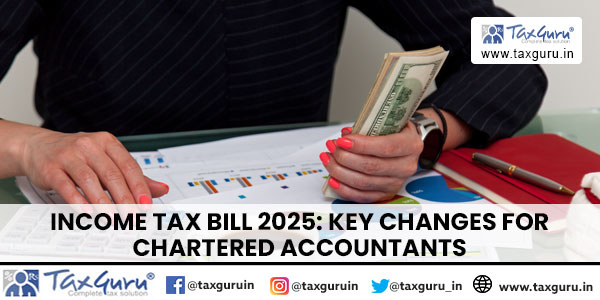Going to Start New era of Chartered Accountant Profession with The Income tax Bill 2025
Summary: The Income Tax Bill, 2025, was introduced in the Lok Sabha on February 13, 2025, aiming to replace the existing Income Tax Act of 1961, which had become extensive due to multiple amendments over the past six decades. The bill comprises 23 chapters, 536 sections, and 622 pages, with its provisions set to take effect from April 1, 2026, unless otherwise specified. A key highlight is the definition of “accountant” in Section 2(1), which refers to Chartered Accountants as defined in the Chartered Accountants Act, 1949, provided they hold a valid certificate of practice. However, certain individuals are excluded from this role, including ineligible company auditors under Section 141(3) of the Companies Act, 2013, partners, employees, and individuals with financial interests in the assessee. The bill seeks to clarify the role of Chartered Accountants in tax compliance and representation while setting restrictions to avoid conflicts of interest.

The Income Tax Bill, 2025 has been introduced in Lok Sabha Today 13.02.2025
Overall, it tries to replace the 1961 Act, which critics had become voluminous due to amendments made over the past 60 years.
The Income tax Bill 2025 is divided in 23 Chapters, 536 Sections on 622 pages.
As per Section 1(3) of The Income tax Bill 2025
“Save as otherwise provided in this Act, it shall come into force on the 1st April, 2026.”
Every section has own importance but section 2 of every act has special importance same thing also reflect in bill also.
This Bill definition Define that what is the Importance of a Chartered Accountant in the Income tax Act.
Because the Section 2 start with the definition 2(1) “accountants” shall have the meaning assigned to it in section 515(3)(b);
Section 515(3)(b)
(b) “accountant” means a chartered accountant as defined in section 2(1)(b) of the Chartered Accountants Act, 1949, who holds a valid certificate of practice under section 6(1) of that Act, but does not include [except for representing the assessee under sub-section (1)],-
(i) in case of an assessee, being a company, a person who is not eligible for appointment as an auditor of the said company under section 141(3) of the Companies Act, 2013; or
(ii) in any other case, —
(A) the assessee himself, or in the case of being a firm or association of persons or a Hindu undivided family, any partner of such firm or a member of such association or such Hindu undivided family;
(B) for an assessee, being a trust or institution, any person referred to in section 355(h)(i) or (ii) or (iii) or (iv);
(C) for any person other than the persons referred to in sub-clauses (A) and (B), the person who is competent to verify the return under section 263 as per section 265;
(D) any relative of any of the persons referred to in sub-clauses (A), (B) and (C);
(E) an officer or employee of the assessee;
(F) an individual, who, is a partner, or who is in the employment, of an officer or employee of the assessee;
(G) an individual, who or his relative or partner—
is holding any security of, or interest in, the assessee and the face value of such security or interest held by his relative does not exceed one lakh rupees;
is indebted to the assessee, and such debt in case of his relative does not exceed one lakh rupees;
has given a guarantee or provided security in connection with the indebtedness of a third person to the assessee and such relative gives a guarantee or provides security for an amount not exceeding one lakh rupees;
(H) a person who, whether directly or indirectly, has business relationship with the assessee of such nature, as prescribed;
(I) a person convicted by a court of an offence involving fraud and ten years has not elapsed from the date of such conviction.





